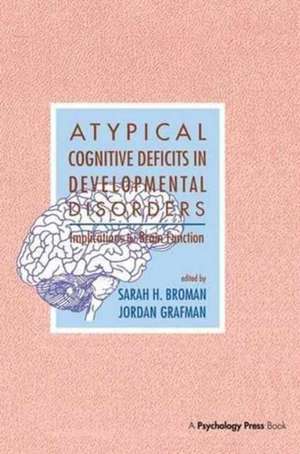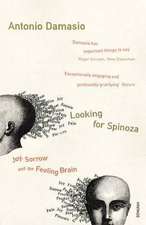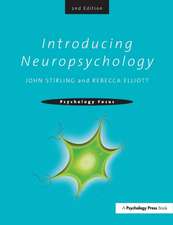Atypical Cognitive Deficits in Developmental Disorders: Implications for Brain Function
Editat de Sarah H. Broman, Jordan Grafmanen Limba Engleză Paperback – 3 aug 2016
The focus of this book is a discussion of the multidisciplinary research findings from studies of autism, and Williams and Turner syndromes. The approaches, methods, techniques, and findings reported are at the cutting edge of neuroscience research on complex behavior patterns and their neural substrates. Each disorder is accompanied by some degree of general cognitive impairment or mental retardation. Of greater interest are the atypical deficits in which a cognitive function is spared, such as language in Williams syndrome, or is disproportionately depressed as are spatial discrimination skills and visual-motor coordination in Turner syndrome. Drastically reduced or seemingly absent language capabilities and little interaction with other people characterize the core autism syndrome. A comprehensive and critical discussion of appropriate statistical techniques is made vivid by examples given from studies of small groups or single subjects in neurolinguistics and related fields.
Preț: 448.86 lei
Nou
Puncte Express: 673
Preț estimativ în valută:
85.89€ • 89.92$ • 71.07£
85.89€ • 89.92$ • 71.07£
Carte tipărită la comandă
Livrare economică 05-19 aprilie
Preluare comenzi: 021 569.72.76
Specificații
ISBN-13: 9781138964129
ISBN-10: 1138964123
Pagini: 360
Dimensiuni: 152 x 229 mm
Greutate: 0.44 kg
Ediția:1
Editura: Taylor & Francis
Colecția Psychology Press
Locul publicării:Oxford, United Kingdom
ISBN-10: 1138964123
Pagini: 360
Dimensiuni: 152 x 229 mm
Greutate: 0.44 kg
Ediția:1
Editura: Taylor & Francis
Colecția Psychology Press
Locul publicării:Oxford, United Kingdom
Public țintă
ProfessionalCuprins
Contents: I. Rapin, Foreword. L.P. Lipsitt, Preface. S.H. Broman, J. Grafman, Introduction. Part I:Cognition and Neurostructure. P.S. Goldman-Rakic, Specification of Higher Cortical Functions. Part II:Studies of Developmental Disorders. Section I:Williams Syndrome. U. Bellugi, P.P. Wang, T.L. Jernigan, Williams Syndrome: An Unusual Neuropsychological Profile. T.L. Jernigan, U. Bellugi, Neuroanatomical Distinctions Between Williams and Down Syndromes. H.J. Neville, D.L. Mills, U. Bellugi, Effects of Altered Auditory Sensitivity and Age of Language Acquisition on the Development of Language-Relevant Neural Systems: Preliminary Studies of Williams Syndrome. Section II:Autism. E. Schopler, Neurobiologic Correlates in the Classification and Study of Autism. E. Courchesne, J.P. Townsend, N.A. Akshoomoff, R. Yeung- Courchesne, G.A. Press, J.W. Murakami, A.J. Lincoln, H.E. James, O. Saitoh, B. Egaas, R.H. Haas, L. Schreibman, A New Finding: Impairment in Shifting Attention in Autistic and Cerebellar Patients. M. Sigman, What Are the Core Deficits in Autism? L. Waterhouse, Severity of Impairment in Autism. Section III:Turner Syndrome. B.J. White, The Turner Syndrome: Origin, Cytogenetic Variants, and Factors Influencing the Phenotype. B.G. Bender, M.G. Linden, A. Robinson, Neurocognitive and Psychosocial Phenotypes Associated with Turner Syndrome. R. Johnson, Jr., J.L. Ross, Event-Related Potential Indications of Altered Brain Development in Turner Syndrome. Part III:Research Methods. E. Bates, M. Appelbaum, Methods of Studying Small Samples: Issues and Examples. Part IV:Commentary. M.B. Denckla, Interpretations of a Behavioral Neurologist. J.M. Fletcher, Afterword: Behavior-Brain Relationships in Children.
Recenzii
"This book has been a pleasure to read and review. Such consistently high-level essays are rare in edited books, but in this case it is understandable given the participants of the workshop. I found myself informed as a clinician and researcher, not only in terms of content but more importantly in terms of methodology..."
—Contemporary Psychology
"...this monograph provides incisive, insightful, broad but focused epistemologic discussions of issues that investigators of children's cognition, language, social ability, and other behaviors, and their relation to underlying brain maturation, ignore at their own peril. Held at the start of the Decade of the Brain, the conference on Atypical Cognitive Deficits in Developmental Disorders: Implications for Brain Function aptly sets the scene for the Decade by laying out the requirements for conceptually, methodologically, and technologically sound multidisciplinary research in this area. It provides investigators with thoughtful and rich essays they will want to ponder, return to, and discuss throughout the Decade of the Brain."
—Dr. Isabelle Rapin
Albert Einstein College of Medicine from the Foreword
—Contemporary Psychology
"...this monograph provides incisive, insightful, broad but focused epistemologic discussions of issues that investigators of children's cognition, language, social ability, and other behaviors, and their relation to underlying brain maturation, ignore at their own peril. Held at the start of the Decade of the Brain, the conference on Atypical Cognitive Deficits in Developmental Disorders: Implications for Brain Function aptly sets the scene for the Decade by laying out the requirements for conceptually, methodologically, and technologically sound multidisciplinary research in this area. It provides investigators with thoughtful and rich essays they will want to ponder, return to, and discuss throughout the Decade of the Brain."
—Dr. Isabelle Rapin
Albert Einstein College of Medicine from the Foreword
Notă biografică
Sarah H. Broman, Jordan Grafman















